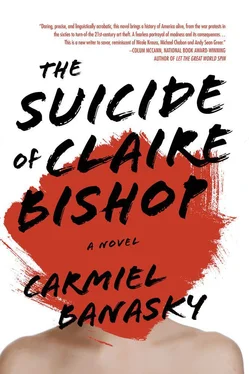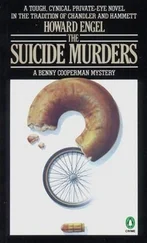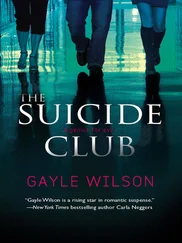Claire did not tell her what was wrong that day, or the next. She brushed her teeth, kissed Leo in his crib, crawled into bed like any other night. She went to work the next morning, and the morning after that, and almost enjoyed the monotonous task of thanking strangers and filing them away, garnering praise for a job well done. She was quieter than usual, but her coworkers didn’t know any different. And Mary didn’t seem to notice until Claire nearly dropped Leo while soaking him in the tub. Her mistake was apologizing too profusely.
“What is wrong with you lately?” Mary said, leaning into the bathroom. “You’re walking around like a zombie.”
“Yes,” Claire replied.
“Yes what? Did you even hear what I said?”
“Yes,” Claire said, finally making eye contact.
“What did I say?”
Claire looked up at her blankly. She searched Mary’s eyes for an answer, watched her face change strangely. It wasn’t until Mary kneeled down and touched Claire’s face that Claire realized she was crying.
“I’m crying,” Claire said matter-of-factly, as if she’d stated she were hungry.
“Why are you so private with me?” Mary pleaded. “You have to let me in. You have to.” It was so sincere and desperate, that plea — it reminded Claire of Nicolette attempting to explain the portrait.
But Claire shouldn’t have started at the beginning. She told Mary about the painting and about Nicolette, and about telling Nicolette about her grandmother locked in an asylum and slapping her mother, and the many interpretations of the word hereditary . She told her about Tomasz and the old man from the wine receptions and about Jill.
Mary listened and didn’t interject, not once. She was sitting cross-legged on the tile floor now, holding Leo in a towel, while Claire was perched rigidly on her knees. Finally, Claire got to the part about the man who shot himself in the subway.
Mary broke the silence before it settled. “Why didn’t you come home to me right away? You just went to work? What is wrong with you?”
Telling Mary did not make her feel better. It made her feel frail. It made her feel stupid and needy, stuck in her own story, validating it all by saying it out loud, breathing new life into it. With gnarled teeth the stories latched tighter to Claire’s ankle.
“Really, Claire. How could you have kept that to yourself? You need help.”
“Thank you,” Claire said, not as scornfully as she’d intended.
“Well, I don’t know what to say to fix it,” Mary said. “I can’t help you. You need someone who can.”
“You don’t have to fix anything. There’s nothing to fix. You sound like a man.”
Mary banged her head on the porcelain ledge of the tub and growled in frustration. Leo cried out at being jostled so. But when Mary lifted her face, it was with a smile and drawing toward Claire. “I do not sound like a man,” she said, burying her head in Claire’s neck, Leo between them. “You’re the one who saw someone die, and I’m acting like I need comforting.”
It would be nice to feel her own body again, particularly against Mary’s. To be in herself, not above herself. Claire let herself sink into Mary, let her skin feel Leo-skin and Mary-skin, the softly overwhelming smell of baby powder, the everything of Mary. She did need Mary. She needed Mary. She needed.
It was nearing April and there was still no sign of spring. After putting Leo down, Mary sat in the nursery chair, making herself comfortable.
“Aren’t you coming to bed?” Claire asked in the doorway.
“He’s getting ill, I can tell. I want to stay with him a while.”
“Come to bed with me. I need your body heat. It’s so cold.” Claire took Mary’s arms to lift her from the chair, but Mary didn’t rise.
“I’ll be in later.”
Claire dropped Mary’s hands and looked down at her. “I want you here with me,” she tried, which was more or less what she’d intended to say. Just as Mary could feel Leo’s sickness approaching, Claire could feel Mary drifting away. She’d seen Mary do this before, but she was never the one being strayed from.
“I am here,” Mary whispered. “You’re being paranoid. And you’re going to wake Leo.”
“But I want you.”
“Right now?”
She knew if she brought it up again, Mary would drift further, perhaps even say Claire was clingy — she knew that was how Mary saw her. But it would pass, and Mary would return. Claire was certain she would.
She turned to go to bed alone, but remembered at the last moment—“The stove’s been finicky lately, have you noticed?”
Mary didn’t respond.
“The gas isn’t catching. Should we worry about affixiation? At night — can you imagine? Maybe that’s why Leo’s sick.”
“Asphyxiation, not ‘affixiation,’” Mary said.
“You think it’s possible?”
“No. We don’t have to worry about that. Or anything. You’re always worrying about something.” Leo stirred, and though he didn’t cry, Mary stood and lifted him from his crib, his head on her shoulder. She bounced him up and down.
“I’m sorry,” Claire said, “I didn’t mean—”
“I know you didn’t mean.”
Claire stood in front of Mary and caressed the back of Leo’s new hair. “We should call someone though. Get it fixed.”
“Whatever you want. Call someone.” Mary turned her back to Claire so that Leo faced her. He let out a watery burp, then said something that sounded like, “No way.”
“Who should I call?” Claire asked.
“You’ve been here how long and you don’t know how to find a phone number? I can’t take care of everything. You’re exhausting!”
Claire stepped away from them both. She was suddenly so tired her eyes began to droop. She said, “I’m just talking about the stove.”
The day the postcard arrived, they brought the mail in together, and Claire did not have to make the decision of whether to read Mary’s private letter or not.
Claire stared at the front — a watercolor of a cactus almost touching the moon, arizona scrawled in neon pink across the sky — while Mary held it up, reading the back. It was brief, apparently, because Mary looked up after just a moment, with a confused expression.
“What does it say?” Claire asked.
Mary stared at her as if she hadn’t heard, then disappeared with it into the bedroom.
Claire imagined and reimagined that letter in so many different ways that she went to sleep with that man’s handwriting scrawling out her dreams. He wrote with a woman’s script, in her mind, and told Mary he loved her and would leave his family for her. That’s what Mary had always wanted, wasn’t it? Though she’d never said it out loud. Morning after morning, Claire woke up angry with Mary for something awful she had done to Claire in her dreams, though Claire could never remember the specifics. Only the feeling of dread remained.
Two weeks passed without mention of the postcard. The easiest, most uneventful two weeks they had spent together in many months. Over dinner together (flavorless casserole — one of Mary’s recent attempts at cooking), with Leo in his high chair talking up a storm of mostly nonsense, Mary asked Claire if she ever overheard insider information about the upcoming election at work in the Democratic Office.
“You know I only daydream,” Claire said. “Some spy I’d be.”
“What do you daydream about?” Mary asked with food in her mouth, no manners at all.
“You, silly. And getting a dog. Do you think we should someday? For Leo.”
“You daydream about getting a dog?”
“Maybe. If we ever move out of the city.”
Mary took a large bite and chewed slowly and silently. When she’d swallowed, she said, without much humor in her voice, “ You want to move out of the city. Who are you and what planet have you taken the real Claire Bishop to?”
Читать дальше












